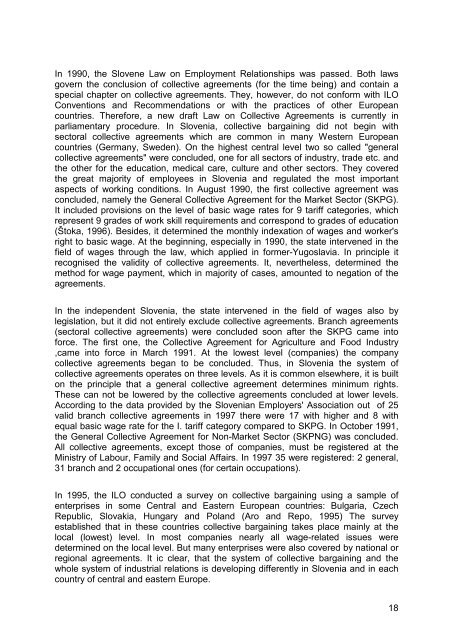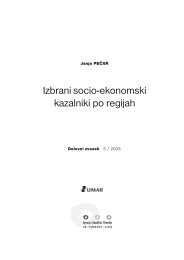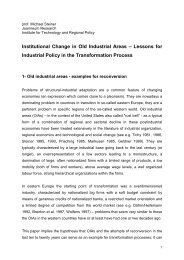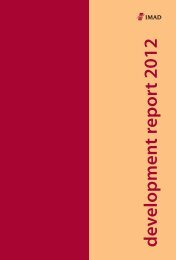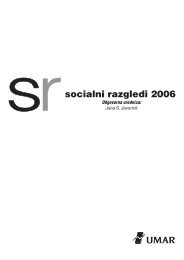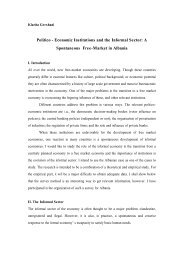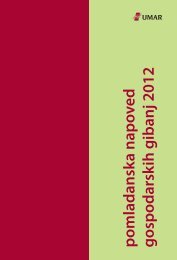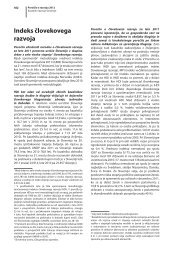The Development of New Industrial Relations in Slovenia - UMAR
The Development of New Industrial Relations in Slovenia - UMAR
The Development of New Industrial Relations in Slovenia - UMAR
Create successful ePaper yourself
Turn your PDF publications into a flip-book with our unique Google optimized e-Paper software.
In 1990, the Slovene Law on Employment <strong>Relations</strong>hips was passed. Both laws<br />
govern the conclusion <strong>of</strong> collective agreements (for the time be<strong>in</strong>g) and conta<strong>in</strong> a<br />
special chapter on collective agreements. <strong>The</strong>y, however, do not conform with ILO<br />
Conventions and Recommendations or with the practices <strong>of</strong> other European<br />
countries. <strong>The</strong>refore, a new draft Law on Collective Agreements is currently <strong>in</strong><br />
parliamentary procedure. In <strong>Slovenia</strong>, collective barga<strong>in</strong><strong>in</strong>g did not beg<strong>in</strong> with<br />
sectoral collective agreements which are common <strong>in</strong> many Western European<br />
countries (Germany, Sweden). On the highest central level two so called "general<br />
collective agreements" were concluded, one for all sectors <strong>of</strong> <strong>in</strong>dustry, trade etc. and<br />
the other for the education, medical care, culture and other sectors. <strong>The</strong>y covered<br />
the great majority <strong>of</strong> employees <strong>in</strong> <strong>Slovenia</strong> and regulated the most important<br />
aspects <strong>of</strong> work<strong>in</strong>g conditions. In August 1990, the first collective agreement was<br />
concluded, namely the General Collective Agreement for the Market Sector (SKPG).<br />
It <strong>in</strong>cluded provisions on the level <strong>of</strong> basic wage rates for 9 tariff categories, which<br />
represent 9 grades <strong>of</strong> work skill requirements and correspond to grades <strong>of</strong> education<br />
(Štoka, 1996). Besides, it determ<strong>in</strong>ed the monthly <strong>in</strong>dexation <strong>of</strong> wages and worker's<br />
right to basic wage. At the beg<strong>in</strong>n<strong>in</strong>g, especially <strong>in</strong> 1990, the state <strong>in</strong>tervened <strong>in</strong> the<br />
field <strong>of</strong> wages through the law, which applied <strong>in</strong> former-Yugoslavia. In pr<strong>in</strong>ciple it<br />
recognised the validity <strong>of</strong> collective agreements. It, nevertheless, determ<strong>in</strong>ed the<br />
method for wage payment, which <strong>in</strong> majority <strong>of</strong> cases, amounted to negation <strong>of</strong> the<br />
agreements.<br />
In the <strong>in</strong>dependent <strong>Slovenia</strong>, the state <strong>in</strong>tervened <strong>in</strong> the field <strong>of</strong> wages also by<br />
legislation, but it did not entirely exclude collective agreements. Branch agreements<br />
(sectoral collective agreements) were concluded soon after the SKPG came <strong>in</strong>to<br />
force. <strong>The</strong> first one, the Collective Agreement for Agriculture and Food Industry<br />
,came <strong>in</strong>to force <strong>in</strong> March 1991. At the lowest level (companies) the company<br />
collective agreements began to be concluded. Thus, <strong>in</strong> <strong>Slovenia</strong> the system <strong>of</strong><br />
collective agreements operates on three levels. As it is common elsewhere, it is built<br />
on the pr<strong>in</strong>ciple that a general collective agreement determ<strong>in</strong>es m<strong>in</strong>imum rights.<br />
<strong>The</strong>se can not be lowered by the collective agreements concluded at lower levels.<br />
Accord<strong>in</strong>g to the data provided by the <strong>Slovenia</strong>n Employers' Association out <strong>of</strong> 25<br />
valid branch collective agreements <strong>in</strong> 1997 there were 17 with higher and 8 with<br />
equal basic wage rate for the I. tariff category compared to SKPG. In October 1991,<br />
the General Collective Agreement for Non-Market Sector (SKPNG) was concluded.<br />
All collective agreements, except those <strong>of</strong> companies, must be registered at the<br />
M<strong>in</strong>istry <strong>of</strong> Labour, Family and Social Affairs. In 1997 35 were registered: 2 general,<br />
31 branch and 2 occupational ones (for certa<strong>in</strong> occupations).<br />
In 1995, the ILO conducted a survey on collective barga<strong>in</strong><strong>in</strong>g us<strong>in</strong>g a sample <strong>of</strong><br />
enterprises <strong>in</strong> some Central and Eastern European countries: Bulgaria, Czech<br />
Republic, Slovakia, Hungary and Poland (Aro and Repo, 1995) <strong>The</strong> survey<br />
established that <strong>in</strong> these countries collective barga<strong>in</strong><strong>in</strong>g takes place ma<strong>in</strong>ly at the<br />
local (lowest) level. In most companies nearly all wage-related issues were<br />
determ<strong>in</strong>ed on the local level. But many enterprises were also covered by national or<br />
regional agreements. It ic clear, that the system <strong>of</strong> collective barga<strong>in</strong><strong>in</strong>g and the<br />
whole system <strong>of</strong> <strong>in</strong>dustrial relations is develop<strong>in</strong>g differently <strong>in</strong> <strong>Slovenia</strong> and <strong>in</strong> each<br />
country <strong>of</strong> central and eastern Europe.<br />
18


